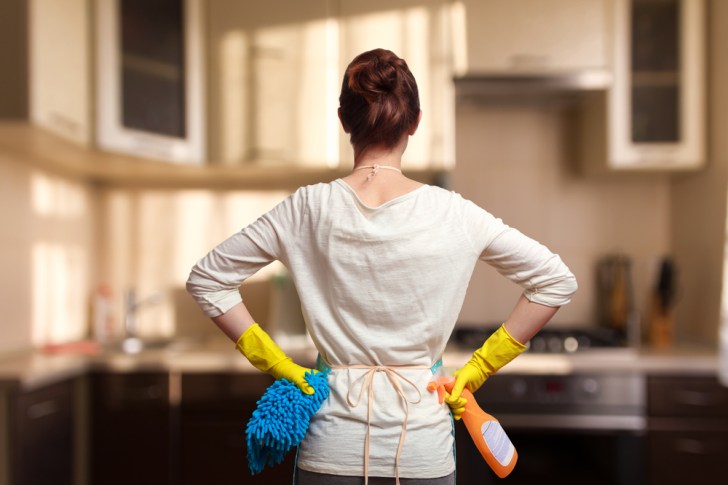A new study from the Canadian Medical Association Journal links childhood obesity to commonly used household cleaning products. Items you use every day in your home, like disinfectants and multisurface cleaners, could be contributing to weight gain in your child by altering their gut bacteria when they’re infants. Whether you mean to or not, you could be exposing your child to dangerous chemicals that affect the way they digest and absorb food.

kwanchai.c/Shutterstock
The Canadian researchers found that fecal samples from 3- and 4-month-old infants who were exposed to antibacterial cleaners weekly had higher levels of a gut bacteria known as Lachnospiraceae, which removes energy from food. Babies in this group would more likely to have a higher BMI and be overweight or obese by age 3.
On the other hand, parents who used eco-friendly cleaning products in the study had children who were less likely to be overweight. They also had lower levels of a different bacteria, Enterobacteriaceae.
The study consisted of 757 babies between 3-4 months old, whose fecal samples were collected and parents were asked how often they used cleaning products. Follow-ups then occurred at one and three-years-old.
“We found that infants living in households with disinfectants being used at least weekly were twice as likely to have higher levels of the gut microbes Lachnospiraceae at age 3-4 months,” said Professor Anita Kozyrskyj, senior author of the study.
Does this mean you should throw all your traditional cleaners immediately? Are vinegar and baking soda the key to healthy children?

Yuganov Konstantin/Shutterstock
The answer is more complicated than that. As always, correlation does not prove causation. While those infants around traditional cleaning products did prove to gain more weight, there are countless outside factors that could have contributed to it, including exercise, diet, and much more. The self-reported nature of the cleaning products is also a potential confound in the study.
The American Cleaning Institute also refuted the Canadian study’s findings, saying they were “sensational.”
“Proper use of household cleaners and disinfectants is an important contributor to infection control and healthy homes,” Richard Sedlak, ACI executive vice president, technical and international affairs, said. “These products are trusted by families to effectively clean, sanitize and disinfect areas of their homes, reducing opportunities for children at these young ages to suffer significant illnesses. This point was one of many overlooked factors in the reported study.”
What do you think? Are traditional cleaning products a danger to your home? Can they increase the risk of making your kids fat? Or is this all bunk?
